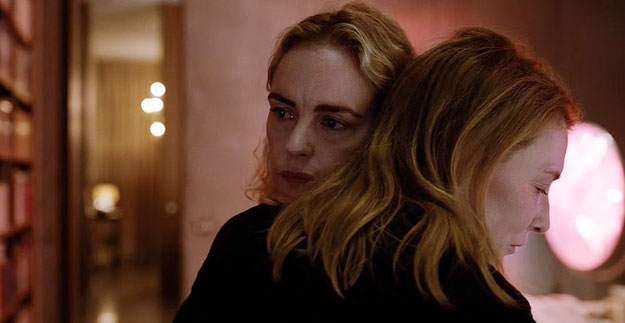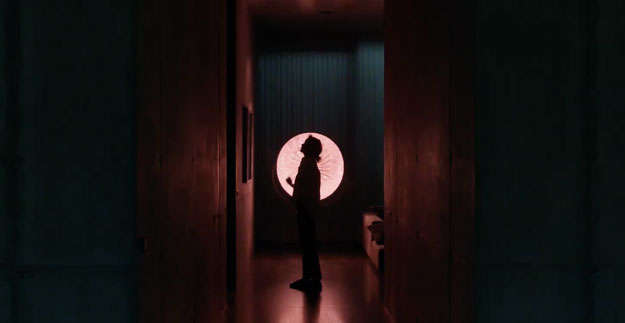
The press screening of Tár is quite a singular experience… the theatre was nearly empty and the movie had the longest opening credits. It’s about 5 minutes long and set to soft but rather dissonant music, which I later learn is supposed to be music being conducted by the film’s protagonist, Lydia Tár.
The film then opens with a mysterious scene of someone texting on an iPhone. Who’s texting to whom isn’t revealed until later, we only get a hint that the topic is Lydia and it doesn’t exactly place her in a positive light. What’s absolutely certain is that Lydia is a maestro. She’s regarded as one of the greatest living composers who was mentored by Leonard Bernstein himself, whom she calls Lenny during her interview with The New Yorker’s Adam Gopnik. As a fan of classical music (my car radio is almost always at 99.5 – Classical MPR), it’s a treat to hear Lydia’s extensive knowledge and deep love for great composers.

Lydia is undoubtedly at the top of her game. She’s won an EGOT and splits her time between NYC where she teaches at Juilliard and Berlin where she conducts the Berlin Philharmonic. At this stage of her life, there are few things she has not accomplished, and she’s in the midst of rehearsal for Gustav Mahler’s Symphony No. 5, the last one of his cycle of symphonies. But the thing with being at the top is there’s only one way but down. It reminds me of Denzel Washington’s quote that he reportedly whispered to Will Smith after the infamous ‘slap’… ‘At your highest moment, be careful, that’s when the devil comes for you.’ Well, in the case of Lydia Tár, she is far too preoccupied with herself and her work to face her own demons.
While Lydia operates at a level of the industry still dominated by men, there are two crucial female figures at play in the film. The first one we see is Lydia’s dutiful assistant and aspiring conductor Francesca, and her patient wife Sharon who’s Berlin Phil’s concertmaster (lead violinist). Lydia treats those close to her the same way she directs those in her orchestra… they must bend to her will or they’d incur her wrath. She shows no mercy to her students either, as displayed in her harsh rebuke of a BIPOC pansexual student who refuses to play Bach’s music as he regards the German composer as racist and misogynist.

If you didn’t know any better, one might think Lydia Tár is a real person instead of a fictitious character conjured up by writer/director Todd Field. Tár is his first film in 16 years since Little Children in 2006, and he’s meticulously researched this subject matter. It’s an intriguing character study of a fascinating fallen star. Some say this movie is about ‘cancel culture,’ but I think it’s an oversimplification as there’s more to it than that. Field also touches upon a thorny issue of ‘Me Too’ in regards to Lydia’s abuse of power, as a disturbing revelation involving Lydia’s former mentee finally comes to light.

Tár is equally beguiling and frustrating, at times too cryptic and perhaps even meandering. I realize that Field doesn’t want to judge his protagonist, so he paints her as both a victim and a perpetrator. We’re supposed to empathize with her as she’s being ‘haunted’ by strange voices and a metronome that suddenly turns on in the middle of the night, while all her transgressions are only implied but never shown. What truly kept me engaged during the nearly 2.5-hour running time is the cast, led by the sublime Cate Blanchett.

I’m running out of adjectives to describe her performance… simply transcendent and mesmerizing. You can’t look away even when Lydia is a classic textbook narcissist. As Lydia is peerless and obsessed with precision, Blanchett too is practically unparalleled in her acting skills and commitment to her art. I read that all the orchestra-conducting scenes are 100% real, she was actually conducting the Dresden Orchestra. She also had to re-learn the piano and how to speak German for her role, which she does brilliantly. Field has reportedly said that if Blanchett had turned down the part, he wouldn’t make the film. That’s wise as I can’t imagine anyone else playing this role. Her exquisite performance is a shoo-in at the Oscar next year and clearly, Blanchett is the one to beat by a wide margin.

I’d also be rooting for German actress Nina Hoss in the Best Supporting Actress race as Lydia’s long-suffering wife. Hoss is a phenomenal actress in her own right, and her quiet but powerful performance is memorable here. She conveys so much emotion with just her eyes, and her silence speaks louder than words. Noémie Merlant is excellent as Francesca, often the one who bears the brunt of Lydia’s tyrannical temperament. Real-life musician Sophie Kauer is quite the scene-stealer as a Russian cellist who’s the latest object of Lydia’s affection. Mark Strong and Julian Glover are both solid character actors who lend memorable supporting roles here.
The classical music world is rarely depicted on screen and the way it’s presented here feels authentic, at least from someone on the outside looking in. Field truly immerses you in Lydia’s universe, with the help of Hildur Guðnadóttir’s music (which features original work as well as extracts from Mahler, among others) and Florian Hoffmeister’ evocative cinematography. There’s an atmospheric, moody feel, even a sense of dread that at times get under your skin. Unfortunately, my viewing experience is occasionally disrupted by the loud noise from the theater next door, which oddly enough happened while Lydia is hearing strange noises.

The ending is one that left me scratching my head… it is obvious Lydia’s career has taken a nosedive caused by her tarnished reputation, but how low does it go? I wouldn’t spoil it for you, but let’s just say Mahler is NOT part of the concert repertoire.
In the end, Lydia Tár remains a sphinxlike enigma. She remains remorseless and untouchable despite everything that’s transpired. The poster for this film is absolutely spot-on as it encapsulates the way people around her view Lydia from below as she’s perched atop a podium, too high and mighty to bother to look down.


I think I’ll wait for it on streaming. I know it’s going to be shown at my local multiplex but I’m too tired to go anywhere right now as I prefer to stay home.
It’s perfectly ok to wait til it hits streaming. Hope you’re doing well, Steven!
This is the first I heard about this movie, not sure if I’ll watch it but I’m a fan of Cate Blanchett. I haven’t seen her in anything since Thor part 3.
I totally forgot about Todd Field, he’s on his way of becoming the next big time director after Little Children but he seems to just want to do smaller films. The last I heard of him was when he’s involved in bringing the ultra violent western Blood Meridian to the big screen after Ridley Scott abandon the project.
If you love Blanchett, it’s definitely worth seeing. She was fantastic in Thor, but this is a role for someone w/ a phenomenal talent like hers, and Field uses that talent well here.
Boy, I remember you mentioned about Blood Meridian like a decade ago, I wonder if that project will ever see the light of day!
Pingback: TÁR Review – Equally Bewildering And Disappointing, Cate Blanchett's Exquisite Performance Is Impeccable.
Pingback: TÁR Review – equally beguiling and frustrating, but Cate Blanchett’s exquisite performance is flawless – MFinance
Pingback: TÁR Review – equally beguiling and irritating, however Cate Blanchett’s beautiful efficiency is flawless | Top Stories
I had not heard of this one — I’m a fan of Blanchett as well. Sounds like with all its flaws, still worthwhile to see. I haven’t seen a Todd Field film so this should be of interest.
I don’t think they have a big budget for marketing this one but I knew about it from the rave reviews from Venice Film Festival. This is my first Todd Field film as well, his previous movie Little Children didn’t appeal to me. Blanchett is the reason to see this!
Excellent review. Can’t wait for this, it sounds so interesting.
Thanks Louisa! I’m curious to hear your thoughts about the film, but as far as Blanchett goes, it’s practically perfection!
Pingback: October 2022 Recap + Movie of the Month – FLIXCHATTER FILM BLOG
Pingback: TV Review: Tom Clancy’s Jack Ryan Season 3 – FLIXCHATTER FILM BLOG
Pingback: Catching up with Oscar-nominated Movies – Searches for ‘Everything Everywhere’ + ‘Banshees of Inisherin’ soar after noms announcement – FLIXCHATTER FILM BLOG
I have thought about Tár for a very long time and watched it many times because I found it so disturbing. Not the movie as much as the reviews and comments. I wasn’t watching the same movie as anyone else; this is clearly a wonderful example of how the viewer brings her own life experiences to film. I didn’t find Lydia to be ‘monstrous’ or ‘narcissistic’. I found the character acting as all brilliant artists act. I’ve worked for a number of bosses with far less talent, who were truly horrors. Trust me, Lydia Tár is not.. So let me begin by describing Francesca. The woman I saw was a cultured, sophisticated self- assured woman. Francesca absorbed all of this from the beginning of her life. She was a product of the European old moneyed strata of society. She was scum and monumentally stupid. She had keys to Lydia’s apartment. She stole Lydia’s composition of Maher’s Fifth for Phil(?) who eventually conducted the Maher piece. She set the metronome. She encouraged that nutbar Krista. Francesca saw in Krista another ally in her quest to further her career. Krista, the pampered princess of a wealthy, powerful, American family was told ‘no’ for the first time in her life. It drove her mad. In a fit of pique, she took her life. Sharon, Lydia’s wife also came from a musically prominent, old money, German family that somehow survived the nightmare of Germany in the 20th century. She was right to take Lydia to task-she knew how to maneuver through these difficult times. And she had come to terms with her wife being a philanderer; just because you are a lesbian doesn’t mean you aren’t going suffer in the same way Mrs. Bernstein suffered. And the Russian cellist? Another member of the privileged aristocracy of musicians; this time survivors of the horrors of Russian life. Having to gain the respect and love of the musicians of the Berlin Phil was easy for her. She had been through much worse. So, on to Lydia. A working class kid from Staten Island who played the accordion; yet, became the world renown conductor of the Berlin Phil. And the audience of this movie thinks she’s come to the end of her career? Wow. My girl is just warming up. She’s plopped in a third world country to conduct music. She knows that world well. Like Maher, the abandonment by her spouse, heralds the beginning of her greatest achievements. And she is in Asia. With young, wealthy people as her audience (and orchestra). The largest new market for orchestral music and Lydia Tár waltzes in. In five years, she will be head of the Tokyo Phil. with Sharon as her assistant and that beautiful, lovely child will be there with both of them. Sidebar: Maybe things have changed at Juilliard but in the past guest musicians were invited to teach a master class. The classes were renowned for the toughness of the teachers and only the most prepared, serious artist-student were allowed in. I’ve never hear of a Juilliard student ‘not liking Bach’ for any reason. It’s a wonderful dramatic twist that serves the film well, but, I doubt it’s true. Thank you for letting me write this long comment. Wishing you all the best.